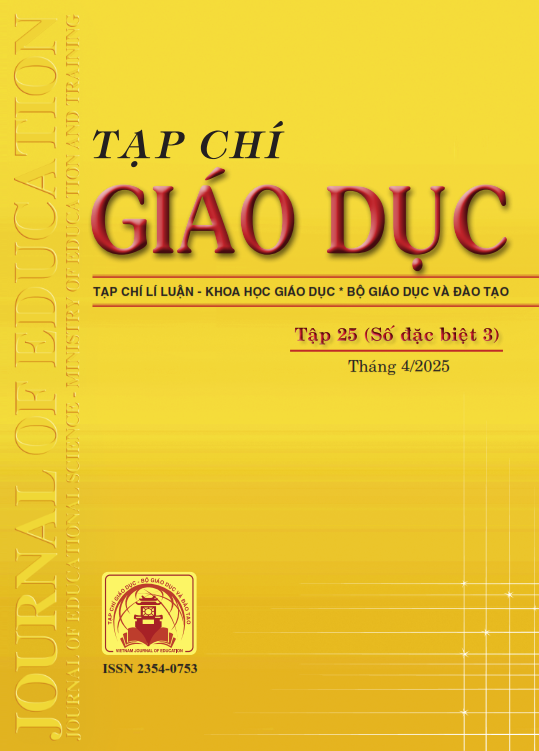Tổng quan nghiên cứu về quản lí chất lượng giáo dục đại học theo mô hình CIPO
Tóm tắt
In the context of increasingly competitive and diversified higher education, improving training quality is an essential requirement to meet the demand for high-quality human resources and global trends. Universities need to seek effective management models to ensure sustainable development. This study aims to analyze quality management models in education, particularly the CIPO model (Context - Input - Process - Output), to assess its effectiveness in managing higher education quality. Using a literature review and bibliometric analysis (VOSviewer), the research identifies the appropriate components of the CIPO model in the university context. The findings indicate that this model serves as a useful tool for enhancing higher education quality. The study recommends that educational administrators and policymakers adopt the CIPO model to improve training quality. Future research may test the proposed components in practice to refine and adapt the model to specific educational systems.
Tài liệu tham khảo
Alhajia, I. M., Yewb, W. T., & Abd Razakc, N. (2020). Models of Program Evaluation for Teacher Education Training. International Journal of Innovation, Creativity and Change, 12(8), 540-554.
Bùi Ngọc Hữu Vinh, Nguyễn Thành Nhân (2020). Tổng quan lí thuyết và đề xuất mô hình đảm bảo chất lượng giáo dục bên trong trường đại học trong bối cảnh hội nhập và đổi mới giáo dục Việt Nam. Tạp chí Khoa học Quản lí giáo dục, 04(28), 15-24.
Chang, D. F., & Lin, N. J. (2018). Applying CIPO indicators to examine internationalization in higher education institutions in Taiwan. International Journal of Educational Development, 63, 20-28.
Đào Hoàng Nam (2024). Quản lí đào tạo theo mô hình CIPO tại Trường Đại học Bạc Liêu. Tạp chí Thiết bị Giáo dục, 1(310), 377-380.
Đỗ Trọng Tuấn (2015). Quản lí chất lượng đào tạo tại các trường đại học tư thục khu vực miền Trung Việt Nam. Luận án tiến sĩ Khoa học giáo dục, Viện Khoa học Giáo dục Việt Nam.
Hulpia, H., & Valcke, M. (2004). The use of performance indicators in a school improvement policy: The theoretical and empirical context. Evaluation & Research in Education, 18(1-2), 102-119.
Niedermeier, F. (2017). Designing Effective Quality Management Systems in Higher Education Institutions. Module 1. In Randhahn, S. & Niedermeier, F. (Eds.) Training on Internal Quality Assurance Series. Duisburg/Essen: DuEPublico. http://dx.doi.org/10.17185/duepublico/43222
Nguyễn Thị Hiền (2020). Một số định hướng phát triển hệ thống đảm bảo chất lượng bên trong tại các trường đại học Việt Nam. Tạp chí Giáo dục, 474, 16-21.
Phạm Văn Hải (2020). Quản lí đào tạo tại Trường Đại học Điện lực theo hướng tiếp cận CIDO. Luận án tiến sĩ Quản lí giáo dục, Viện Khoa học Giáo dục Việt Nam.
Scheerens, J. (1990). School Effectiveness and the Development of Process Indicators of School Functioning. School Effectiveness and School Improvement, 1, 61-80. http://doi.org/10.1080/0924345900010106
Van Petegem, K., Aelterman, A., Van Keer, H., & Rosseel, Y. (2008). The influence of student characteristics and interpersonal teacher behaviour in the classroom on student’s wellbeing. Social Indicators Research, 85, 279-291.
Vũ Đức Tân, Phan Hùng Thư (2020). Thực trạng quản lí chất lượng chương trình đào tạo ngành An toàn thông tin tại Học viện Kĩ thuật Mật mã. Tạp chí Khoa học Giáo dục Việt Nam, 18(9), 48-53.
Zgodavová, K., Urbancikova, N., & Kisela, M. (2015). Enhancement of the quality assurance model at the Slovak University: Case study. Quality Innovation Prosperity, 19(2), 01-17.
Zhang, J., Yang, J., Chang, M., & Chang, T. (2016). Towards a critical understanding to the best practices of ICT in K-12 education in global context. ICT in education in global context: The best practices in K-12 Schools, 1-17.
Đã Xuất bản
Cách trích dẫn
Số
Chuyên mục
Giấy phép

Tác phẩm này được cấp phép theo Ghi nhận tác giả của Creative Commons Giấy phép quốc tế 4.0 .












